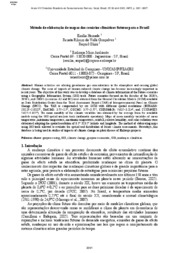Método de elaboração de mapas dos cenários climáticos futuros para o Brasil.
Método de elaboração de mapas dos cenários climáticos futuros para o Brasil.
Autoria: HAMADA, E.; GONÇALVES, R. R. V.; GHINI, R.
Resumo: Human activities are altering greenhouse gas concentrations in the atmosphere and causing global climate change. The issue of impacts of human-induced climate change has become increasingly important in recent years. The objective of this work was to develop a database of climate information of the future scenarios using a Geographic Information System (GIS) tools. Future scenarios focused on the decades of the 2020?s, 2050?s, and 2080?s (scenarios A2 and B2) were obtained from the General Circulation Models (GCM) available on Data Distribution Centre from the Third Assessment Report (TAR) of Intergovernmental Panel on Climate Change (IPCC). The TAR is compounded by six GCM with different spatial resolutions (ECHAM4:2.8125×2.8125º, HadCM3: 3.75×2.5º, CGCM2: 3.75×3.75º, CSIROMk2b: 5.625×3.214º, and CCSR/NIES: 5.625×5.625º). The mean monthly of the climate variables was obtained by the average from the available models using the GIS spatial analysis tools (arithmetic operation). Maps of mean monthly variables of mean temperature, minimum temperature, maximum temperature, rainfall, relative humidity, and solar radiation were elaborated adopting the spatial resolution of 0.5° X 0.5° latitude and longitude. The method of elaborating maps using GIS tools allowed to evaluate the spatial and distribution of future climate assessments. Nowadays, this database is being used in studies of impacts of climate change on plant disease of Embrapa projects.
Ano de publicação: 2009
Tipo de publicação: Artigo em anais e proceedings
Unidade: Embrapa Meio Ambiente
Observações
1 - Por padrão são exibidas publicações dos últimos 20 anos. Para encontrar publicações mais antigas, configure o filtro ano de publicação, colocando o ano a partir do qual você deseja encontrar publicações. O filtro está na coluna da esquerda na busca acima.
2 - Para ler algumas publicações da Embrapa (apenas as que estão em formato ePub), é necessário ter, no celular ou computador, um desses softwares gratuitos. Sistemas Android: Google Play Livros; IOS: iBooks; Windows e Linux: software Calibre.
Acesse outras publicações
Acesse a Base de Dados da Pesquisa Agropecuária (BDPA) para consultar o acervo completo das bibliotecas da Embrapa.

